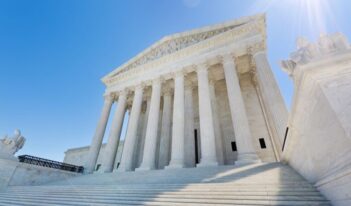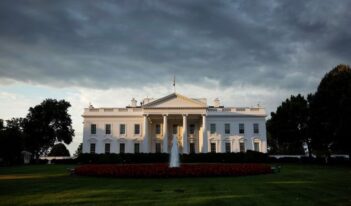
The Biden Administration should reject arguments to re-incarcerate people released from prison during the COVID-19 pandemic.
In the waning days of the Trump Administration, the U.S. Department of Justice cast doubt on the futures of nearly 8,000 people currently living in home confinement.
In a short memorandum released just five days before President Donald J. Trump left office, the Department declared that the Federal Bureau of Prisons must return people in home confinement back to prison at the end of the COVID-19 pandemic. But doing so would cause enormous disruption and unnecessary suffering for incarcerated people and their families. The Biden Administration should revise this declaration and allow the Bureau to continue supervising people in home confinement when the pandemic subsides.
Prior to the pandemic, incarcerated people could only spend six months or ten percent of their sentences in home confinement, whichever was less. Under the CARES Act, however, the U.S. Congress authorized the Bureau of Prisons to permit federally incarcerated people to spend longer periods of their sentences at home.
But an important legal question arises for those currently on home confinement: When the Act’s covered emergency period ends, must they return to prison to complete their sentences?
According to the Trump Administration’s Office of Legal Counsel (OLC), the answer is “yes.”
The text of the CARES Act, however, is actually silent on this question. And in fact, the better reading of both the CARES Act and other laws governing the Bureau’s home confinement authority would allow the Bureau to permit people who are currently assigned to home confinement to remain confined to their homes after the pandemic ends.
Key language in the CARES Act states that “during the covered emergency period,” if the conditions of the COVID-19 pandemic so require, “the director of the Bureau may lengthen the maximum amount of time for which the director is authorized to place a prisoner in home confinement.”
Under the Trump Administration, OLC interpreted this language to mean that, when the COVID-19 emergency is over, the Bureau of Prisons must abide by preexisting federal law, which only permits home confinement for short periods of time. OLC explained that when the covered emergency period ends, the Bureau must “recall” those currently in home confinement back to federal prisons, unless they would still be eligible for home confinement under the pre-CARES Act guidelines.
Yet contrary to the Trump OLC’s assertions, the CARES Act does not explicitly require that people in home confinement be recalled to federal prisons. What the CARES Act limits to the covered emergency period is the Bureau Director’s authority to lengthen the permissible amount of time that people can spend in home confinement. Once a person’s home confinement period is properly lengthened by the Bureau—during the emergency, when the Bureau has the authority to do so—nothing in the law requires that someone’s period of home confinement must be shortened once the pandemic is over. The statute only limits when the Bureau of Prisons has authority to move people into home confinement for longer durations of their sentence.
In short, the CARES Act does not speak at all to whether the Bureau may drag people in home confinement back to federal prisons after the pandemic ends, let alone demand that the Bureau do so.
The Trump OLC’s interpretation also contradicts the purpose of the home confinement program, which is to “afford the prisoner a reasonable opportunity to adjust to and prepare for his reentry into the community.” Removing people from their homes and re-incarcerating them after they have already begun the process of reentry would cause enormous disruptions for incarcerated people and their families, which undermines the program’s goals.
OLC reasoned in its January memo that the Bureau’s expanded home confinement authority is “circumscribed by” the emergency conditions surrounding the enactment of the CARES Act. OLC gestured at the CARES Act’s expiration provision—which provides that the Bureau’s expanded authority ends 30 days after the emergency period ends—as evidence that Congress wanted the Bureau of Prisons to re-incarcerate people when the emergency subsides. In support of this position, OLC asserted that the “decision to place a prisoner in home confinement is not a one-time event” because the Bureau has continuous discretion to relocate people under its supervision.
But this reading of the CARES Act language strains credulity.
The act of placing someone in a new location does not require “ongoing action” just because that person can be moved or monitored. The Bureau of Prisons, of course, does have discretion to relocate incarcerated people, including moving them from home confinement back to prison. But a decision to do so must be made subsequent to the decision to place that person in home confinement in the first place. The more logical reading of the CARES Act is that Congress sought to limit the Bureau’s authority to initiate transfers of people into longer periods of home confinement—and the Bureau’s authority to do so ends when the covered emergency period does.
In addition, the Trump Administration’s OLC asserted that, after the covered emergency period ends, the Bureau of Prisons is not statutorily authorized to keep people in home confinement for long periods because home confinement is not a “penal or correctional facility.” According to OLC, the definition of “facilities” does not include homes. But this argument, too, is supported by supposition only, without any explicit support in the statutory text.
When people are placed in home confinement or house arrest, they are subjected to conditions that do make home confinement both “penal” and “correctional.” They may be subject to extensive electronic monitoring and restrictions on their freedom of movement. Those people are also required to comply with imposed special conditions, including participation in treatment programs and consistent reporting requirements. If prisoners in home confinement fail to report to their probation officers or to other specified locations, they are considered “escapees.”
Even if the proper reading of the CARES Act were a close call—and it is not—the Trump OLC’s interpretation runs contrary to the spirit of the rule of lenity. Under this rule, when a statute related to criminal law is ambiguous, court must adopt the interpretation that favors people accused of crimes. Although the rule of lenity typically operates when courts are interpreting statutes that define criminal offenses, its principles should apply in the home confinement context, where people have already been convicted of federal crimes.
Rather than construe the CARES Act narrowly, the Trump OLC presented an overly broad interpretation of the law in order to subject people on home confinement to harsher and more punitive conditions.
The Trump OLC’s interpretation is not only inconsistent with lenity; it is also incompatible with compassion and human decency.
The OLC memo calls for taking individuals away from their families and reincarcerating them, even after the Bureau of Prisons has determined that living at home is more appropriate for these individuals than living in prison. It demands that people who have started transitioning to life outside of prison once again say goodbye to their loved ones and return to life in prison, even if they have done nothing but comply with the Bureau’s supervisory conditions while in home confinement.
Under the Biden Administration, OLC can change its interpretation of the CARES Act by revoking the memo it rushed to release in the closing days of the Trump Administration and issuing a new one. President Joseph R. Biden, his Attorney General, or the General Counsel of the Bureau of Prisons should ask OLC to do so. OLC should remedy its error and come to a conclusion that better accords with the CARES Act and better advances principles of justice.



